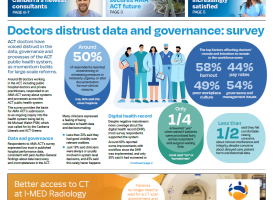Healthcare sector approach to AI required
Australia needs stronger governance and regulation of artificial intelligence (AI) and the health sector requires its own separate strategy to protect patients, consumers, healthcare professionals and their data.

In a submission to a Department of Industry, Science and Resources discussion paper, Supporting responsible AI, the Australian Medical Association said the key challenge with AI in Australia is it remains largely unregulated with a lack of transparency on the ethical principles of AI developers and no real governance arrangements in place.
AMA President Professor Steve Robson said the AMA sees significant opportunities in the appropriate application of AI in healthcare, provided proper governance arrangements are put in place.
“AI is a rapidly evolving field with varying degrees of understanding among clinicians, other health care professionals, administrators, consumers and the wider community.
“We need to address the AI regulation gap in Australia, but especially in healthcare where there is the potential for patient injury from system errors, systemic bias embedded in algorithms and increased risk to patient privacy.
“We applaud the government for undertaking these important discussions and we think a separate discussion with all health sector stakeholders needs to happen.
“There are key health principles that need to be introduced into AI for example ensuring patients and practitioners consent to the episode of care and/or their personal data being used for machine learning.
“There has been a lot of good work done by the European Union, Canada and other countries around privacy, data ownership and governance that we can learn from and adapt to the Australian and healthcare contexts, and we need to examine this through the healthcare lens, so we get it right for the future wellbeing of our patients.”
The AMA’s position on successful regulation of AI in healthcare, is that a common set of agreed principles are embedded in legislation that establish a compliance baseline for all those involved under appropriate governance of AI.
Those principles should ensure:
- safety and quality of care provided to patients
- patient data privacy and protection
- appropriate application of medical ethics
- equity of access and equity of outcomes through elimination of bias
- transparency in how algorithms used by AI and ADM tools are developed and applied
- that the final decision on treatment should always rest with the patient and the medical professional, while at the same time recognising the instances where responsibility will have to be shared between the AI (manufacturers), the medical professionals and service providers (hospitals or medical practices).



